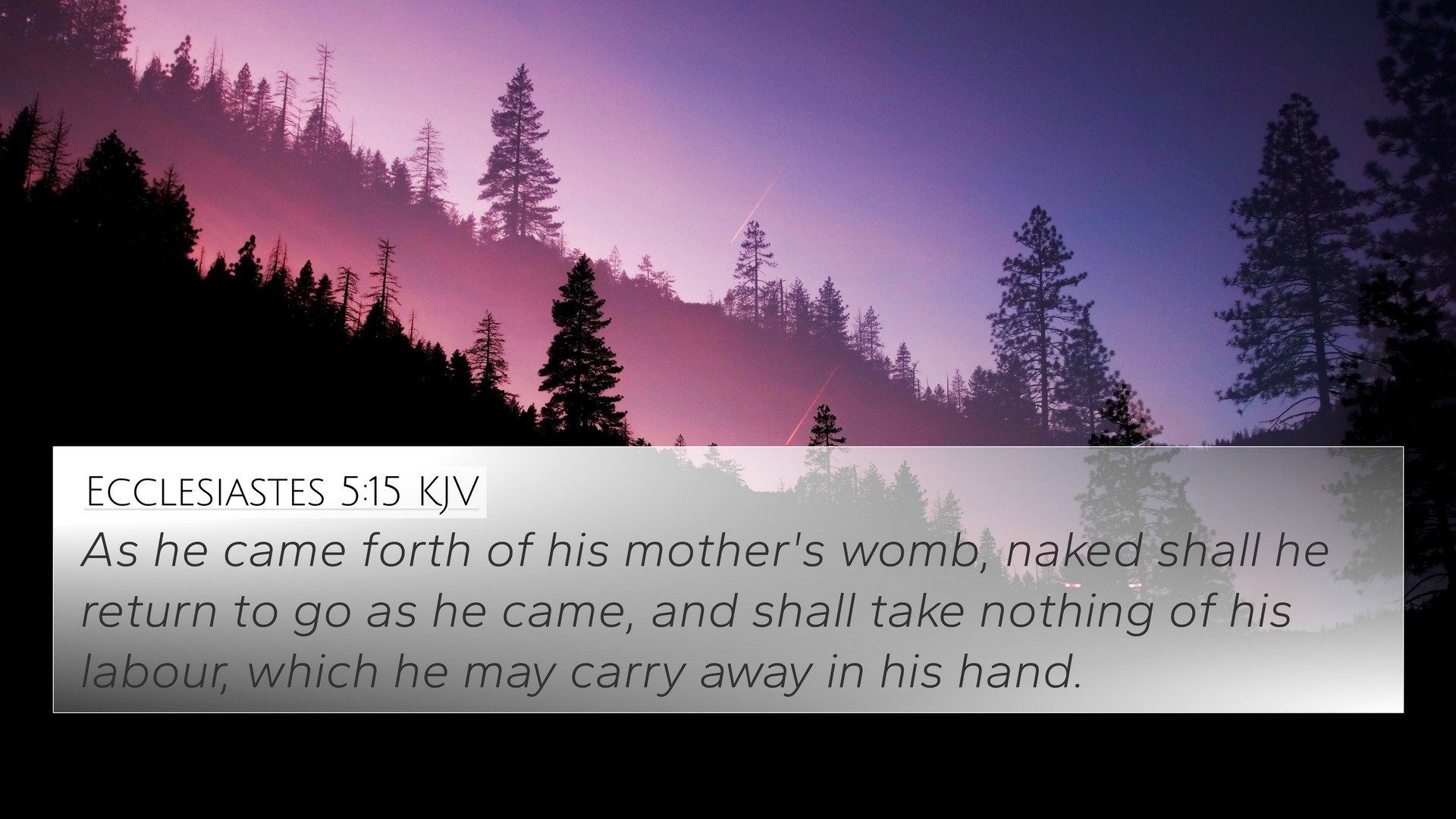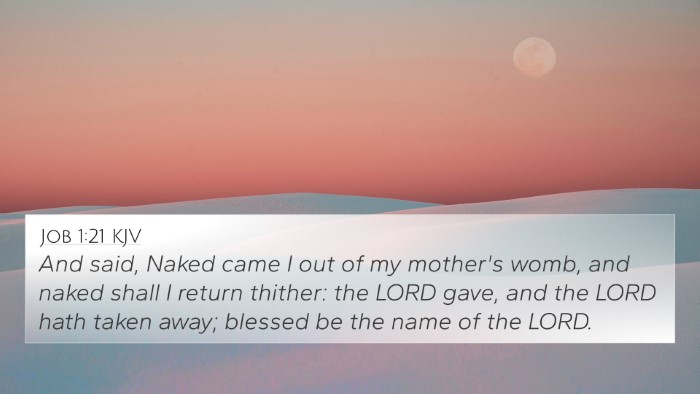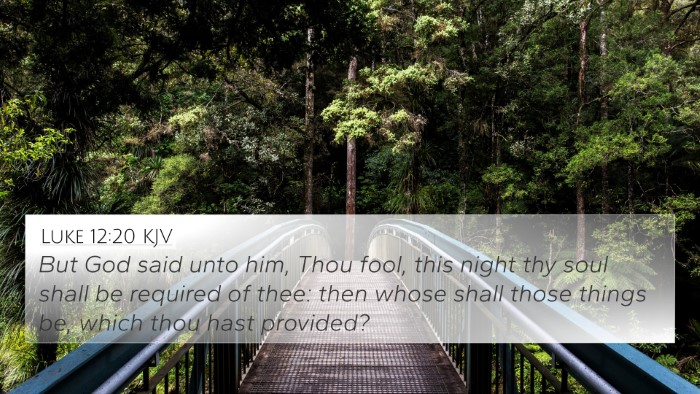Understanding Ecclesiastes 5:15
Ecclesiastes 5:15 states: "As he came from his mother’s womb, so shall he return, to go as he came; and he shall take nothing of his labor, which he may carry away in his hand." This verse conveys a profound truth about the transience of human life and the futility of earthly gains.
Summary of Biblical Insights
This verse from Ecclesiastes encapsulates the universal theme of life’s brevity and the inevitable reality of death. It suggests that no matter how much one accumulates in life, we ultimately leave empty-handed. The reflections by various public domain commentators enrich our understanding:
-
Matthew Henry:
Henry underscores that all worldly possessions are temporary. His commentary stresses that life’s pursuits are vain if they are solely based on material gain. He suggests that true wealth is spiritual, and believers should focus on eternal values rather than temporary achievements.
-
Albert Barnes:
Barnes emphasizes that material goods cannot accompany us after death. He relates this verse to the concept of mortality and the importance of living with the understanding that our life’s work should have eternal significance, reflecting a deeper, spiritual connection rather than mere earthly accomplishments.
-
Adam Clarke:
Clarke provides a more philosophical view, linking the verse to the cycles of life. He explains that the verse illustrates the futility of wealth and success without a spiritual foundation. Clarke invites readers to consider their pursuits in light of eternity, suggesting that the only lasting inheritance is that of wisdom and righteousness.
Thematic Connections
There are several key themes that arise from Ecclesiastes 5:15, reflecting the overarching messages throughout the Bible:
-
Life’s Transience:
This verse mirrors themes found in Bible verses on mortality. For example, Psalms 39:5 declares, "Behold, You have made my days as handbreadths, and my age is as nothing before You." Both verses reflect on the fleeting nature of human existence.
-
Spiritual Riches vs. Earthly Wealth:
In Matthew 6:19-21, Jesus teaches about storing treasures in heaven rather than on earth, highlighting the temporary nature of worldly possessions. This echoes the sentiment of Ecclesiastes 5:15.
-
The Inevitability of Death:
Similar to Hebrews 9:27, which states, "And as it is appointed for men to die once, but after this the judgment," Ecclesiastes reminds believers of the certainty of death and the importance of living accordingly.
-
Divine Sovereignty:
This is reminiscent of Job 1:21, where Job acknowledges, "The Lord gave, and the Lord has taken away; blessed be the name of the Lord." It emphasizes the transient nature of human life and the authority of God over it.
-
Contentment in Simplicity:
Proverbs 15:16 teaches that better is a little with the fear of the Lord than great treasure and trouble with it, suggesting that true wealth is found in a relationship with God, aligning with the message of Ecclesiastes.
-
Temporal vs. Eternal Perspectives:
2 Corinthians 4:18 emphasizes focusing on the unseen eternal rather than the seen temporal, which is again aligned with the message of Ecclesiastes regarding life's fleeting nature.
-
The Role of Work:
Colossians 3:23-24 reminds believers that whatever they do, they should do it heartily, as to the Lord and not to men, thereby reflecting the idea that labor should have an eternal purpose.
Practical Application
In applying the insights from Ecclesiastes 5:15, the following points are crucial:
- Focus on eternal values: Invest in relationships, spiritual growth, and acts of kindness that have lasting significance.
- Reassess priorities: Regularly evaluate where you place your time, efforts, and resources to ensure they align with a life that honors God.
- Find contentment: Recognize the value of simplicity and the futility of chasing after fleeting pleasures or wealth.
- Prepare for eternity: Use the time wisely to prepare for what comes after life on earth, fostering a relationship with God that lasts beyond physical existence.
Cross-References for Deeper Study
As you explore Ecclesiastes 5:15, consider these related verses for a comprehensive understanding:
- Romans 14:10-12 - "For we shall all stand before the judgment seat of Christ." It emphasizes the accountability we have for our lives.
- 1 Timothy 6:7 - "For we brought nothing into this world, and it is certain we can carry nothing out." This mirrors the core message of Ecclesiastes 5:15.
- Proverbs 11:4 - "Riches do not profit in the day of wrath, but righteousness delivers from death." It speaks to the eternal perspective on wealth.
- Matthew 16:26 - "For what will it profit a man if he gains the whole world, and loses his own soul?" This reinforces the theme of prioritizing spiritual over material gain.
- Luke 12:15 - “Take heed and beware of covetousness, for one’s life does not consist in the abundance of the things he possesses.”
- Philippians 3:19 - "Their end is destruction, whose god is their belly, and whose glory is in their shame – who set their mind on earthly things." This verse cautions against focusing on the temporary.
- James 4:14 - "For what is your life? It is even a vapor that appears for a little time and then vanishes away." This directly correlates with Ecclesiastes' themes of life's brevity.
Conclusion
Ecclesiastes 5:15 serves as a sobering reminder of life's temporary nature and the ultimate futility of earthly pursuits. By integrating insights from Matthew Henry, Albert Barnes, and Adam Clarke, alongside cross-referencing with related scriptures, readers can gain deeper insights into the biblical understanding of wealth, mortality, and the importance of a life aimed at eternal pursuits.






